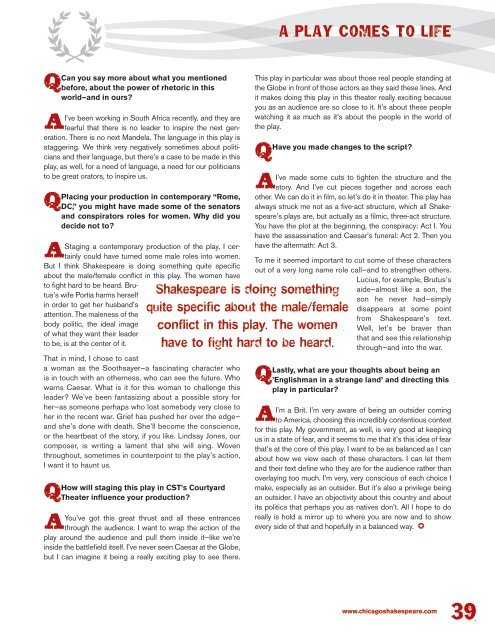Julius Caesar • 2013 - Chicago Shakespeare Theater
Julius Caesar • 2013 - Chicago Shakespeare Theater
Julius Caesar • 2013 - Chicago Shakespeare Theater
You also want an ePaper? Increase the reach of your titles
YUMPU automatically turns print PDFs into web optimized ePapers that Google loves.
Q Can you say more about what you mentioned<br />
before, about the power of rhetoric in this<br />
world—and in ours?<br />
I’ve been working in South Africa recently, and they are<br />
A fearful that there is no leader to inspire the next generation.<br />
There is no next Mandela. The language in this play is<br />
staggering. We think very negatively sometimes about politicians<br />
and their language, but there’s a case to be made in this<br />
play, as well, for a need of language, a need for our politicians<br />
to be great orators, to inspire us.<br />
Q Placing your production in contemporary “Rome,<br />
DC,” you might have made some of the senators<br />
and conspirators roles for women Why did you<br />
decide not to?<br />
Staging a contemporary production of the play, I cer-<br />
A tainly could have turned some male roles into women.<br />
But I think <strong>Shakespeare</strong> is doing something quite specific<br />
about the male/female conflict in this play. The women have<br />
to fight hard to be heard. Brutus’s<br />
wife Portia harms herself<br />
in order to get her husband’s<br />
attention. The maleness of the<br />
body politic, the ideal image<br />
of what they want their leader<br />
to be, is at the center of it.<br />
That in mind, I chose to cast<br />
a woman as the Soothsayer—a fascinating character who<br />
is in touch with an otherness, who can see the future. Who<br />
warns <strong>Caesar</strong>. What is it for this woman to challenge this<br />
leader? We’ve been fantasizing about a possible story for<br />
her—as someone perhaps who lost somebody very close to<br />
her in the recent war. Grief has pushed her over the edge—<br />
and she’s done with death. She’ll become the conscience,<br />
or the heartbeat of the story, if you like. Lindsay Jones, our<br />
composer, is writing a lament that she will sing. Woven<br />
throughout, sometimes in counterpoint to the play’s action,<br />
I want it to haunt us.<br />
Q How will staging this play in CST’s Courtyard<br />
<strong>Theater</strong> influence your production?<br />
You’ve got this great thrust and all these entrances<br />
A through the audience. I want to wrap the action of the<br />
play around the audience and pull them inside it—like we’re<br />
inside the battlefield itself. I’ve never seen <strong>Caesar</strong> at the Globe,<br />
but I can imagine it being a really exciting play to see there.<br />
<strong>Shakespeare</strong> is doing something<br />
quite specific about the male/female<br />
conflict in this play. The women<br />
have to fight hard to be heard.<br />
A PLAY COMES TO LIFE<br />
This play in particular was about those real people standing at<br />
the Globe in front of those actors as they said these lines. And<br />
it makes doing this play in this theater really exciting because<br />
you as an audience are so close to it. It’s about these people<br />
watching it as much as it’s about the people in the world of<br />
the play.<br />
Q Have you made changes to the script?<br />
I’ve made some cuts to tighten the structure and the<br />
A story. And I’ve cut pieces together and across each<br />
other. We can do it in film, so let’s do it in theater. This play has<br />
always struck me not as a five-act structure, which all <strong>Shakespeare</strong>’s<br />
plays are, but actually as a filmic, three-act structure.<br />
You have the plot at the beginning, the conspiracy: Act I. You<br />
have the assassination and <strong>Caesar</strong>’s funeral: Act 2. Then you<br />
have the aftermath: Act 3.<br />
To me it seemed important to cut some of these characters<br />
out of a very long name role call—and to strengthen others.<br />
Lucius, for example, Brutus’s<br />
aide—almost like a son, the<br />
son he never had—simply<br />
disappears at some point<br />
from <strong>Shakespeare</strong>’s text.<br />
Well, let’s be braver than<br />
that and see this relationship<br />
through—and into the war.<br />
Q Lastly, what are your thoughts about being an<br />
’Englishman in a strange land’ and directing this<br />
play in particular?<br />
I’m a Brit. I’m very aware of being an outsider coming<br />
A to America, choosing this incredibly contentious context<br />
for this play. My government, as well, is very good at keeping<br />
us in a state of fear, and it seems to me that it’s this idea of fear<br />
that’s at the core of this play. I want to be as balanced as I can<br />
about how we view each of these characters. I can let them<br />
and their text define who they are for the audience rather than<br />
overlaying too much. I’m very, very conscious of each choice I<br />
make, especially as an outsider. But it’s also a privilege being<br />
an outsider. I have an objectivity about this country and about<br />
its politics that perhaps you as natives don’t. All I hope to do<br />
really is hold a mirror up to where you are now and to show<br />
every side of that and hopefully in a balanced way. ✪<br />
www chicagoshakespeare com 39




